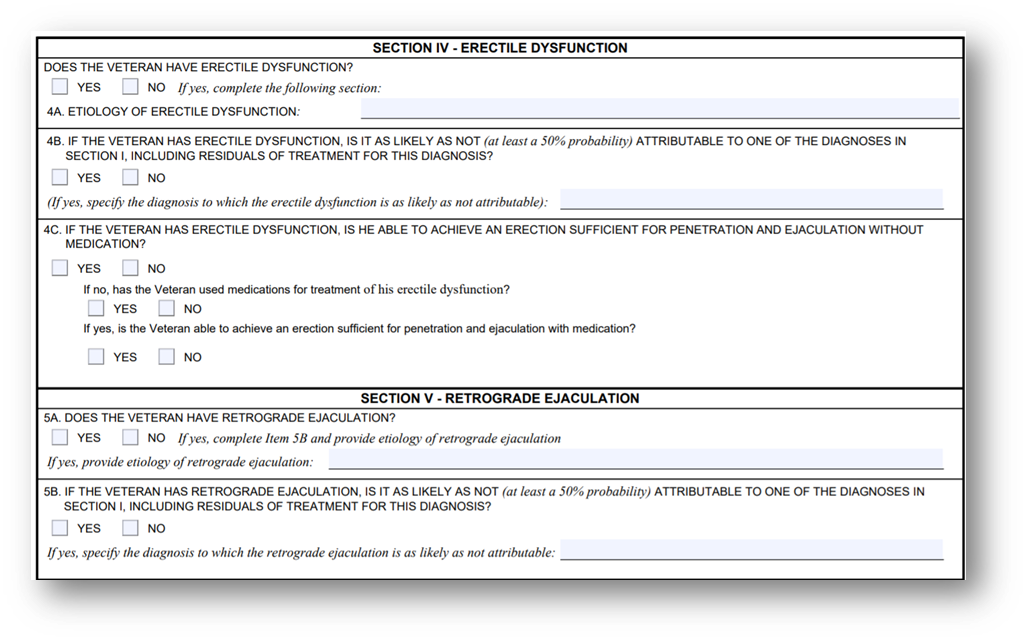Looking for Expert-Level VA Claim Answers?📱Call Us Now! 737-295-2226
Erectile Dysfunction (ED) is a recognized VA disability—typically rated at 0%—that qualifies veterans for Special Monthly Compensation (SMC-K) for “Loss of Use of a Creative Organ.” This added benefit pays extra monthly compensation on top of your regular VA disability pay.
ED is often linked to service-connected conditions, especially mental health issues like PTSD, depression, and anxiety, or the side effects of medications used to treat them.
In this veteran’s guide, you’ll learn how the VA rates ED, how to qualify for SMC-K, and my top 3 tips for proving service connection.
Summary of Key Points
- ED is a VA-recognized disability, typically rated at 0%, but still qualifies for Special Monthly Compensation (SMC-K) for “Loss of Use of a Creative Organ.”
- SMC-K adds extra monthly pay ($139.87 in 2026) on top of your total VA compensation.
- ED is often secondary to mental health conditions like PTSD, depression, or anxiety, or the medications used to treat them.
- To establish a service connection, veterans need a diagnosis, evidence of a primary service-connected condition, and a nexus that links the two.
Table of Contents
What is Erectile Dysfunction (ED) in Veterans?
According to the Mayo Clinic, Erectile Dysfunction (ED) is the inability to get and keep an erection firm enough for sexual intercourse.
If you’re a veteran suffering from ED, it can cause a significant amount of stress in your life, affect your well-being and outlook on life, and contribute to relationship problems.
Common symptoms of Erectile Dysfunction in veterans include:
- Difficulty getting an erection
- Difficulty keeping an erection
- Decreased libido (low sex drive)
Top 3 Tips to Establish Service Connection for Erectile Dysfunction
To file an Erectile Dysfunction VA claim, you must present medical evidence that shows all three of the following:
- Tip #1: Make sure you have a medical diagnosis of Erectile Dysfunction in a medical record, AND
- Tip #2: You must have a “Nexus” for service connection, meaning, your Erectile Dysfunction was caused or made worse by your active duty military service OR your ED is “proximately due to or aggravated by” another service-connected disability rated at 0% or higher, AND
- Tip #3: Current symptoms of Erectile Dysfunction that negatively impact your work, life, or social functioning documented in a medical record. It also helps to write a strong personal VA statement in support of a claim.
ED VA Ratings
While ED is assigned a 0% rating under SMC-K, there are five other scheduler rating categories that are related to Erectile Dysfunction, the penis, and testicles, which are rated as follows:
DC 7520: If half or more of the penis is removed, then it is rated 30%. This condition can also be rated under the urinary rating system if that can result in a higher rating than 30%.
DC 7521: If the Glans is removed, it is rated 20%. This condition can also be rated under the urinary rating system if that can result in a higher rating than 20%.
DC 7522: If the penis is deformed and cannot erect, then it is rated 20%. The following two requirements must be met before a 20% evaluation can be assigned for deformity of the penis with loss of erectile power under 38 CFR 4.115b, DC 7522:
- The deformity must be evident, AND
- The deformity must be accompanied by loss of erectile power.
DC 7523: Atrophy of the testicles is when they shrink and become nonfunctional. If one testicle is atrophied, then it is rated 0%. If both testicles are atrophied, then it is rated 20%.
DC 7524: If both testicles are removed, it is rated 30%. If only one testicle is removed, it is rated 0%. There are a few conditions for this code. If the testicle was removed because it was not fully developed or did not descend, then it is not ratable since this is a pre-existing condition and not directly related to military service. If the testicle had to be removed because of an injury or condition that is related to military service, and the remaining testicle is not functioning (whether it is related to service), it is rated 30%.
How to Get VA Special Monthly Compensation for Erectile Dysfunction
Getting service-connected for Erectile Dysfunction at 0 percent means eligible veterans can obtain Special Monthly Compensation (SMC) for loss of use of a creative organ.
This is known as SMC(K) and it is paid out each month on top of your other VA disability pay.
The 2026 pay rate for VA Special Monthly Compensation for Erectile Dysfunction is $139.87 per month.
How to Establish Secondary Service Connection for Erectile Dysfunction
To prove ED is secondary to a service-connected condition, you must show it is caused or aggravated by that condition. The VA requires three key elements:
- Medical diagnosis of ED
– From VA or private medical records (or service treatment records, if applicable) - Evidence of a service-connected primary condition
– Such as PTSD, depression, anxiety, etc., rated at 0% or higher - Medical nexus
– A letter or opinion from a qualified medical professional linking your ED to the primary condition
Erectile Dysfunction as a Secondary Condition
In many cases, Erectile Dysfunction is caused by something physical or mental and can be rated secondary to any of the following service-connected conditions:
- Heart disease
- Certain prescription medications
- Clogged blood vessels (Atherosclerosis)
- Hypertension (High Blood Pressure)
- Diabetes
- Obesity as an “interim link” for secondary service connection
- Parkinson’s disease
- Multiple sclerosis
- Peyronie’s disease (scar tissue inside the penis)
- Various sleep disorders (Insomnia, Sleep Apnea, etc.)
- Treatments for prostate cancer or enlarged prostate
- Surgeries or injuries that affect the pelvic area or spinal cord
- Low testosterone
Mental Health and Erectile Dysfunction in Veterans
Mental health conditions can disrupt sexual arousal and contribute to Erectile Dysfunction (ED). Common service-connected causes include:
- PTSD
- Depression
- Anxiety
- Other mental health conditions
Veterans may qualify for secondary service connection for ED—especially if diagnosed after service.
- SSRIs prescribed for PTSD, depression, or anxiety often cause or worsen ED.
- ED can be rated secondary to these mental health conditions and their treatment.
How to File a VA Claim for Erectile Dysfunction
Filing a VA claim for Erectile Dysfunction (ED) can be more complex than a standard service-connected claim. That’s because ED is typically rated at 0%, but eligible veterans may receive Special Monthly Compensation (SMC-K) for Loss of Use of a Creative Organ—an added benefit that requires its own evaluation.
To file a successful ED VA claim, you’ll need:
- A current medical diagnosis of ED
- Evidence of a service-connected condition (physical or mental) that caused or aggravated the ED
- A nexus letter from a medical professional linking your ED to your military service or a service-connected condition
Because ED is often secondary to other conditions—like PTSD, depression, or medication side effects—getting proper documentation is key. If approved, your ED claim will not result in a percentage rating, but you can receive additional monthly compensation under SMC-K.
VA C&P Exam for Erectile Dysfunction

The VA Compensation & Pension (C&P) exam for Erectile Dysfunction (ED) is based on the DBQ for Male Reproductive Organ Conditions. Most exams are conducted as ACE exams (records-only), but an in-person exam may be required if the examiner needs to check for physical deformities or other issues.
During the C&P review, the examiner will assess the following:
- Is there a confirmed diagnosis of ED? (Include ICD code and date)
- What is the cause (etiology) of the ED?
- Is it at least as likely as not (50% +) that the ED was caused by military service or a service-connected condition?
- Has the ED been aggravated by any service-connected condition or related medication side effects?
- Can the veteran achieve an erection sufficient for penetration and ejaculation, with or without medication?
The answers help determine service connection and rating eligibility for ED.
SEE ALSO: C&P Exam for ED (Erectile Dysfunction): What to Expect and How to Prepare!
How Does the VA Rater Evaluate VA Disability for ED?
The VA Rater will grant SMC(K) when the medical evidence shows that service-connected ED constitutes Loss of Use (LOU) of a creative organ.
Other diagnoses of sexual dysfunction that may result in LOU include (but are not limited to) loss of libido, loss of or low sex drive, or impotence.
When a VA examiner finds that there is Erectile Dysfunction (ED) or other sexual dysfunction, SMC(K) is established even though:
- The Veteran can achieve erection and penetration with the use of medication, or
- The Veteran had a vasectomy prior to the development of the LOU of a creative organ, as vasectomies may be reversible while LOU is not.
When the evidence, including an examination report or other medical information, shows that a diagnosis of ED or other sexual dysfunction is present but indicates that the Veteran can penetrate and ejaculate without the use of medication, resolve reasonable doubt in the Veteran’s favor and interpret the report to establish that LOU of a creative organ is present and grant entitlement to SMC(K).
(FAQs) Frequently Asked Questions
Is Erectile Dysfunction considered a VA disability?
Yes. ED is a ratable VA disability that typically qualifies for SMC-K, even with a 0% rating.
Can I get VA benefits if my ED is caused by medication side effects?
Yes. ED caused or worsened by medications prescribed for a service-connected condition (like SSRIs for PTSD) can qualify for secondary service connection.
What evidence is needed for secondary service connection for ED?
1. A medical diagnosis of ED, 2. proof of a service-connected primary condition, and 3. A nexus letter connecting the ED to your already service-connected condition.
What happens during the VA C&P exam for ED?
Most are handled via ACE (records-only), but if needed, an in-person exam checks for physical symptoms. The examiner will assess your diagnosis, cause, severity, and any link to service.
How much is the special monthly compensation (SMC(K)) benefit for ED?
As of 2026, $139.87/month, paid in addition to your standard VA disability compensation.
Deserve a VA Rating Increase? We’ve Got You Covered!
How does VA Claims Insider support veterans?
We make the confusing and frustrating VA claim process EASY through our 8-step proprietary system and one-on-one coaching; we’re the VA Claim EXPERTS you can trust, and YOU are never alone in this fight against the VA!
You’ll also receive VA disability expert Brian Reese’s SEM Method Blueprint—a proven formula that has educated over 25,000 veterans on the path to winning their VA disability claims faster:
Strategy + Education + Medical Evidence = VA Rating and Compensation You Deserve FASTER!
Start today and unlock an exceptional level of service you deserve for serving our country:
- You’ll hear from a VA Claim Expert over email within 15 minutes of signing up today.
- You’ll hear from your Veteran Coach team within 24 hours of all inquiries during normal business days/hours.
- Our terms are clear and simple: If we don’t win, you don’t pay. You have nothing to lose and everything to gain.
Click the red button below to start the process of winning your VA claim right now!
About the Author

Brian Reese
Brian Reese is a world-renowned VA disability benefits expert and the #1 bestselling author of VA Claim Secrets and You Deserve It. Motivated by his own frustration with the VA claim process, Brian founded VA Claims Insider to help disabled veterans secure their VA disability compensation faster, regardless of their past struggles with the VA. Since 2013, he has positively impacted the lives of over 10 million military, veterans, and their families.
A former active-duty Air Force officer, Brian has extensive experience leading diverse teams in challenging international environments, including a combat tour in Afghanistan in 2011 supporting Operation ENDURING FREEDOM.
Brian is a Distinguished Graduate of Management from the United States Air Force Academy and earned his MBA from Oklahoma State University’s Spears School of Business, where he was a National Honor Scholar, ranking in the top 1% of his class.

Quality Assurance Team
The Quality Assurance (QA) team at VA Claims Insider has extensive experience researching, fact-checking, and ensuring accuracy in all produced content. The QA team consists of individuals with specialized knowledge in the VA disability claims adjudication processes, laws and regulations, and they understand the needs of our target audience. Any changes or suggestions the QA team makes are thoroughly reviewed and incorporated into the content by our writers and creators.



